“Inspirations and Influences” is a series of articles in which we invite authors to write guest posts talking about their…well, Inspirations and Influences. The cool thing is that the writers are given free rein so they can go wild and write about anything they want. It can be about their new book, series or about their career as a whole.
Hello everyone and happy Monday! Today, our guest is Ann Leckie, author of the most excellent space opera Ancillary Justice, which comes out tomorrow. We will be reviewing the book next Friday (spoiler: it’s top 10 material) and for now, we are super pleased to give the floor to Ann and her inspirations and influences and the (female) writers she read growing up.
Give it up for Ann, everyone!
I’ve loved science fiction pretty much ever since I started reading. My parents–diehard mystery fans–never quite understood why I loved it so much. They were convinced of SF’s inferiority, and even said the “this is good, so it’s not really SF” thing a few times.
But it was what I read, so they were going to support that. They would buy me not-quite-random genre books for birthdays or Christmas–it was my parents who introduced me to Stanislaw Lem, in fact. One year they got me an anthology edited by Brian Aldiss, called Space Opera. That anthology was eye-opening–it was the first time I realized that the kind of science fiction I liked best had a name. (It was also where I first read Jack Vance and Leigh Brackett, and I am eternally grateful for those introductions.)
I didn’t notice at the time that out of fourteen authors, only one was a woman. That was probably because I was about twelve at the time. But even given that, it’s kind of surprising I didn’t notice. The science fiction I was finding on the shelves of the library was mostly by women. Or it seemed that way, sometimes. Anne McCaffrey, Marion Zimmer Bradley, C.J. Cherryh. This was the mid to late seventies, so I was finding Suzy McKee Charnas and Joanna Russ, too (though at twelve I found both authors baffling and a bit frightening). And those are just the names I remember. At the time it seemed to me that science fiction was jam packed with women writers.
So it’s odd to hear, now, that historically science fiction has been a boy’s club. I mean, what about all those women’s names on book spines in the library? What about me and my girlfriends around the cafeteria table, talking Dune and Star Wars over our fish sticks and mac & cheese? What about C.L. Moore and Leigh Brackett and Andre Norton and Ursula LeGuin?
Reading Joanna Russ’s How to Suppress Women’s Writing was eye-opening. Oh! That’s what happened. They’re all there in plain sight–me and my friends, all those Star Trek fans who organized conventions and petitions, all the writers I loved–but when people say “Science Fiction” they draw a line around it that leaves all that out, pretends it never existed, or didn’t really matter if it did.
The effect of always drawing that line that way, as Russ pointed out, is to make women writers seem exceptional. Adrift. And community is actually very important to writers–science fiction, at least, often seems like one big, complicated conversation, books and stories building on and responding to other work. To a certain extent, you don’t get the full impact of a book if you’re not aware of its context, of the work it’s responding to and playing off of. So erasing the bit of the conversation a book is part of also erases much of its significance, dulls its effect.
(Getting the context that allows you to appreciate certain books is, arguably, the main function of literature classes. We don’t just naturally appreciate any good literature–we’ve been trained and educated to appreciate certain things. Or, for most of us in the case of science fiction and fantasy, we’ve trained ourselves, over long years of reading in the genre. We know the context, and when a book we’re reading alludes to another one, we can feel the resonance–but that resonance is inaudible, invisible, not there for readers who aren’t familiar with the same books.)
Thinking about this has led me to think some about lineage and descent. About what tradition I’m working in, who I’m responding to, who has furnished me with the basic materials I work with. And really, it’s people like Andre Norton and C.J. Cherryh. I think probably my foundational space opera is Andre Norton’s The Zero Stone (though runner-up would go to Vance’s Alastor novels). Cherryh’s Foreigner series has left an unmistakeable, indelible mark on Ancillary Justice.
I’m not fit to touch the sandal strap of The Left Hand of Darkness but there’s no question that it’s had a very direct and obvious effect on my own book. The conversation I’m in–the space opera conversation–is a conversation full of both women’s and men’s voices. Of books that are mothers and grandmothers and aunts to mine.
Thank you, Ann.
And now for the giveaway:
Giveaway details
We have one copy of Ancillary Justice up for grabs! The contest is open to addresses in the US and Canada only and will run until Saturday, October 5 at 11:59pm (EST). To enter, use the form below. Good luck!


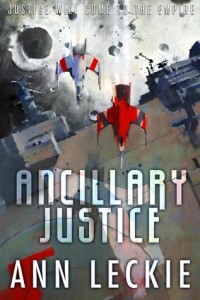
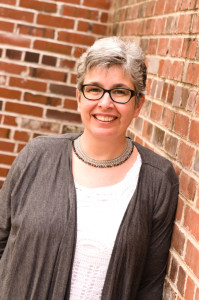
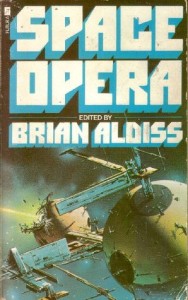
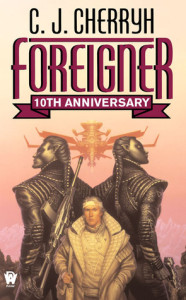
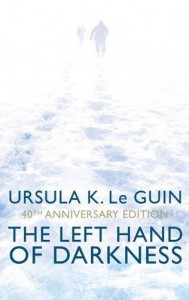
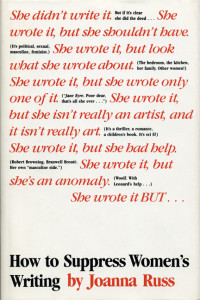
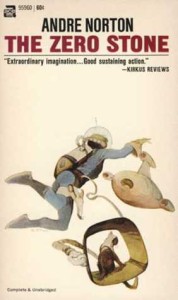










69 Comments
Caroline @ two girls, one suitcase
September 30, 2013 at 7:05 amI really love this post; it is bizarre how so many women writers – not just of sci-fi – have been erased from our cultural consciousness. Have you read this article from The Toast:http://the-toast.net/2013/09/26/new-eves-saving-the-world/ ? It addresses some of the same issues and really makes me want to read the anthology that it’s based around.
Caroline
Eliza
September 30, 2013 at 7:24 amI don’t think I’ve ever read a space opera before–this will be my first!
Halley
September 30, 2013 at 7:39 amI grew up reading Elizabeth Moon’s Serrano series. My parents don’t like science fiction or fantasy, but did indulge me and loved that I read widely growing up.
Erin
September 30, 2013 at 8:35 amThis was a very interesting post. I’m not sure I know what qualifies as space opera exactly–I grew up reading Frederick Pohl and Isaac Asimov, and later discovered the amazing works of Ursula LeGuin and Octavia Butler. I enjoy reading across a wide variety of genres, but SF will always be my first love.
Patricia Eimer
September 30, 2013 at 8:35 amLove this post. It’s amazing how women just get overlooked in SciFi. Science too for that matter.
Paul (@princejvstin)
September 30, 2013 at 8:46 amThanks, Ann!
I want more female characters, and protagonists in my genre fiction because, well, half of the population of the Earth is female. Why shouldn’t that be the case in my reading’s universes?
Raych
September 30, 2013 at 9:18 amWHAT EVEN IS A SPACE OPERA? I obviously need to read this to find out.
Katrina
September 30, 2013 at 9:27 amLois McMaster Bujold’s Cordelia books. I really can’t get into any of the Miles books for some reason, but I adore his mother.
mary anne
September 30, 2013 at 9:43 amI am currently re-reading the Vorkosigan series for the gazillionth time – my absolute favorite series of all types and genres. I heard it called space opera at one point so I assume space opera is character centered and driven sci-fi that in some way involves far planets and space travel. Never really saw a definition.
With that being said, would the Liaden series by Sharon Lee and Steve Miller also fit the bill? I really enjoy that series a lot. Not quite as much as Bujold, but very good.
BenjaminJB
September 30, 2013 at 9:52 amVery interesting and thought-provoking. I think C. L. Moore is particularly interesting in space adventure stories like “Shambleau” that seem to tell one story of male adventure, but are through-and-through interested in men and women.
Lexi
September 30, 2013 at 10:48 amI have to go with Anne McCaffrey. I was given her books when I was very young, which started me looking for more like them.
Carl
September 30, 2013 at 11:34 amDoes Bradbury count? One of my favorite books ever is The Martian Chronicles. There must be some elements of Space Opera in there. Thanks.
jillheather
September 30, 2013 at 11:59 amA lot of genre fiction I have read lately has been fantasy, or just barely SF. Which is cool — I love fantasy — but sometimes I look forward to SF. New book to consider!
superbwg
September 30, 2013 at 12:17 pmI love anything by Anne McCaffery, but as far as Space Opera’s go The Ship Who Sang is probably the most memorable
Sarann
September 30, 2013 at 12:21 pmI feel like I must have read a Space Opera at one point, but I can’t think of one right now. Maybe I haven’t, I need to fix that.
The whole female authors being overlooked is one of those thing that you sometimes don’t notice until someone else points it out. And then you can’t stop seeing it.
Cat Rambo
September 30, 2013 at 12:44 pmGreat interview.
Bren
September 30, 2013 at 1:16 pmI started to read more Space Opera/Sci-Fi this year and I can’t believe that it took me that long to finally read a book by Lois Bujold.
Kate
September 30, 2013 at 1:52 pmI’ve been on quite the sci-fi kick lately and unfortunately caught myself surprised by the number of women authors – it’s amazing what cultural bias can trick you into believing. Glad to have my assumptions corrected, I’ve been working my way through the works of A.C. Crispin and loving them.
Lauren
September 30, 2013 at 3:40 pmI know Orson Scott Card is a controversial figure and all, but I still love Ender’s Game. Interestingly enough, I just looked up “Space Opera” in google, and a posted list of the top 25 Space Opera’s listed only 1 woman (Elizabeth Moon’s Trading Danger), so there you go. The proof is in the pudding, so to speak.
Meghan M
September 30, 2013 at 4:40 pmWhen I was growing up, I was always wandering my library, looking for something new and different. It just so happened that they had a giant science fiction section that I devoured from age eight onward. Some of the first – and ever favorite – ones I picked up was Lois McMaster Bujold’s Vorkosigan series and everything by Anne McCaffrey – The Ship Who Sang was given to me by a librarian, and I always loved it.
Natalia
September 30, 2013 at 5:23 pmIts not that old school but one my favorites is the Mageworlds series starting with “The Price of the Stars” by Debra Doyle and James Macdonald.
Margaret
September 30, 2013 at 5:33 pmNot exactly old school but Elizabeth Moon’s Once a Hero is my favorite space opera. I also love Ender’s Game and adore Ender’s Shadow even though I don’t like Orson Scott Carr and really don’t want to give him my money.
Andrea K
September 30, 2013 at 7:15 pmMy experience is similar – I grew up reading a ton of female science fiction and fantasy authors, and never regarded the genre as dominated by men. Norton, McCaffrey, Bradley, Le Guin, Le Engle, Tanith Lee, Duane, CL Moore…there’s just so many female writers.
The idea that women are something new to science fiction and fantasy is outright silly.
Adrianne
September 30, 2013 at 9:16 pmI hunted up the excerpt for _Ancillary Justice_. What an interesting premise!
I have to say that most of my all time favorite authors are women. It is just plain wrong that publishers and critics have squashed so many women’s careers.
Claire
September 30, 2013 at 9:17 pmI loved This Alien Shore; although anything Le Guin is always fabulous.
Rachel G
September 30, 2013 at 10:05 pmI’m not sure this counts, but I love, love, love the Chaos Wlking Trilogy by Patrick Ness.
Cherie Durbin
September 30, 2013 at 10:21 pmI’m lost in space on this one!
Kathryn
September 30, 2013 at 10:34 pmI always think of space opera as “Star Wars” or swashbuckling science fiction – it has a large dramatic story line and is more character-driven than technology driven (although some of it is very careful to be accurate as possible with the technology). And modern space opera is often concerned with exploring social and cultural issues (e.g., think Bujold and all the discussions about reproduction in Vorkosigan series).
People have already mentioned many of favourite women authors – Bujold, Norton, McCaffrey. Others who have written space-opera books are Sylvia Louise Engdahl who writes mainly YA science fiction (I loved her Enchantress to the Stars when I was a preteen), Sharon Shin, Julie Czerneda, and Catherine Asaro, who holds a PhD in physics.
Jana
October 1, 2013 at 12:02 amI love this post, especially as someone who grew up reading copious amounts of science fiction (whether I understood it at an early age or not, I still devoured it). And I’m really looking forward to reading Ancillary Justice, because the reviews I’ve seen have been just head-over-heels for it!
Favorite space opera, though, rests with E. E. “Doc” Smith. I especially like his treatment of female characters, which always strikes me as progressive for his time: they’re brilliant, pioneers in their scientific fields, and fully competent participants in their own lives.
Justine
October 1, 2013 at 12:33 amI’ll say the Barsoom series by Edgar Rice Burroughs even though some would categorize it as planetary romance instead of space opera.
Gerd D.
October 1, 2013 at 6:26 amE.E. “Doc” Smith’s (or actually Stephen Goldin’s), Family d’Alembert novels, starting with “The Imperial Stars” is something I enjoyed reading a lot.
JenM
October 1, 2013 at 10:51 amI don’t usually read space opera, but I do love Firefly. Does that count?
Serena
October 1, 2013 at 4:29 pmI was having a hard time thinking of a space opera that I have read, but someone mentioned The Ship that Sings” and I remember loving that one.
Becky C.
October 2, 2013 at 10:07 amStar Trek!
Lily
October 2, 2013 at 3:14 pmEnder’s series, hands down!
Lisa Schensted
October 4, 2013 at 11:57 amEnder’s Game is just about the only space opera I’ve read! BUT of course I adore Star Wars AND Star Trek and definitely want to get more into the space scene in book form!
Jen
October 4, 2013 at 12:24 pmI love space opera. One of my favorites is Lee and Miller’s Liaden series. Very much looking forward to reading this book too.
srs
October 4, 2013 at 12:53 pmI don’t know if it is old school or space opera-ish enough, but I love Tanya Huff’s Valor series.
Allison
October 4, 2013 at 3:26 pmI don’t even know what a space opera is! D: this’ll be my first
LisaC
October 4, 2013 at 4:24 pmI love the Lost Fleet and Honor Harrington books.
Mango Heroics
October 4, 2013 at 5:47 pmMy introduction to SFF came from the stacks of paperback novels hidden at the back of my Dad’s closet. I read them and escaped into new worlds, and sometimes new cultures. When I had exhausted his stash, I started on the library shelves, looking for peoples whose cultures made sense, but not in the same way that my culture made sense. I think I became a cultural anthropologist in part because of my love of these books. I think what I loved is what is called excellent world-building – but I call it culture-building. Early examples are Andre Norton and Ursula LeGuin. Later I read everything I could find from Marion Zimmer Bradley (& associates), CJ Cherryh. & Sheri Tepper. Cherryh’s Foreigner comes close to capturing the experience of an Anthropolgist in an unfamiliar field situation. Breq’s interactions with different cultural groups may also evoke similar experiences. I’ve read the excerpt in which she rescues a former “colleague” & look forward to reading the rest. Breq’s quest for vengeance appeals to the part of me that loves epic space opera, but Ann Leckie’s attention to cultural &linguistic detail is why the anthropologist part of me wants to sign on for the ride!
annie
October 4, 2013 at 8:40 pmOoh, this looks good. I’ve just now started Shards of Honor, which definitely counts as a space opera…
Kate & Zena
October 4, 2013 at 9:28 pmStar Wars? I’m not quite sure what a space opera is!
Recensionando / Ancillary Justice | gerundiopresente
July 29, 2015 at 7:03 am[…] Ann Leckie parla della sua esperienza di lettrice di SFF e degli autori e dei libri che l’hanno più influenzata come scrittrice QUI. […]